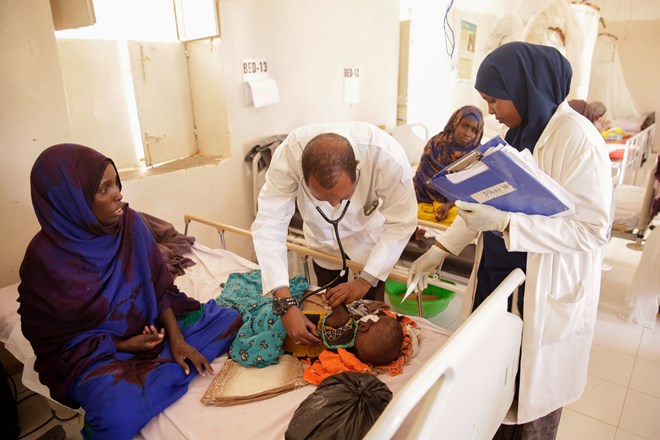
Wednesday September 25, 2024

A doctor and nurse from the International Medical Corps attend to a malnourished child at Galkayo Hospital's stabilization center in Somalia.
Somalia has made significant strides in various sectors since the civil war, but its healthcare system remains one of the most critical areas in need of attention. With a population of over 15 million, Somalia continues to face challenges in providing adequate medical services, but there are also emerging opportunities to rebuild and strengthen the system. Challenges Facing the Healthcare System
One of the most significant challenges Somalia faces is the lack of infrastructure. The country has limited medical facilities, and the majority of its rural population has little to no access to healthcare services. Many hospitals and clinics operating before the war were either destroyed or abandoned; rebuilding them has been a slow process.
Another pressing issue is the need for more trained medical professionals. Decades of conflict have led to a "brain drain," where many qualified doctors, nurses, and healthcare workers left the country in search of safer environments. As a result, the current healthcare system is heavily reliant on a limited number of professionals who are often overworked and under-resourced.
Additionally, infectious diseases such as malaria, tuberculosis, and cholera remain rampant, further straining the system. The ongoing drought and food insecurity also contribute to malnutrition, particularly in children, leading to preventable deaths and long-term health issues.
The Role of International Aid and NGOs
Despite these challenges, international aid and non-governmental organizations (NGOs) continue to play a crucial role in providing healthcare services to Somalia's population. Agencies such as the World Health Organization (WHO), Médecins Sans Frontières (MSF), and UNICEF have been instrumental in addressing immediate healthcare needs, especially in conflict-prone areas.
These organizations have focused on providing emergency medical care, vaccination programs, and maternal health services. While their efforts have been critical in improving health outcomes, there is a growing consensus that sustainable development of Somalia's healthcare system will require more than just emergency aid. Long-term solutions must involve building local capacity and infrastructure.
Opportunities for Growth and Development
Despite the challenges, there are opportunities to transform Somalia's healthcare system. One key area of growth is the potential for public-private partnerships. Investment in healthcare by Somali entrepreneurs, along with support from the government, can lead to the development of new hospitals, clinics, and pharmacies that can serve both urban and rural populations.
Telemedicine is another emerging field that could revolutionize healthcare in Somalia. With the country's growing mobile phone penetration, telemedicine platforms can help bridge the gap between healthcare providers and patients in remote areas. These platforms can provide consultations, diagnostics, and follow-up care, significantly reducing the need for travel to distant medical facilities.
Additionally, Somalia's diaspora community could play a pivotal role in revitalizing the healthcare sector. Many Somali doctors and healthcare professionals living abroad have expressed interest in returning to help rebuild the country's healthcare infrastructure. With the right incentives and support from the government, these professionals can provide much-needed expertise and training to local medical staff.
A Path Forward
While the road to a robust healthcare system in Somalia is still long, there are clear paths forward. A combination of international support, local investment, and government policy can help address the pressing healthcare challenges. Key areas of focus should include expanding access to healthcare in rural areas, investing in local training programs for medical professionals, and leveraging technology to improve service delivery.
Healthcare is a fundamental human right, and a functional healthcare system is essential for Somalia's long-term recovery and development. By addressing the current challenges and seizing new opportunities, Somalia can build a healthier and more resilient future for its people.
Dr Said Abdirasak Abdirahman is a senior lecturer and dean at the University of Health Sciences in Somalia